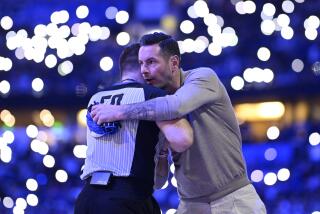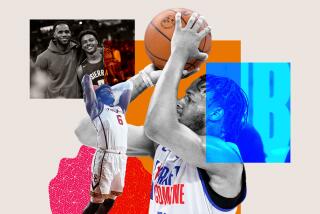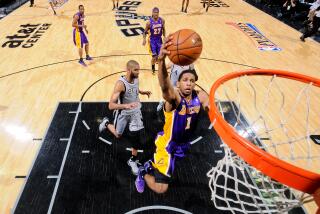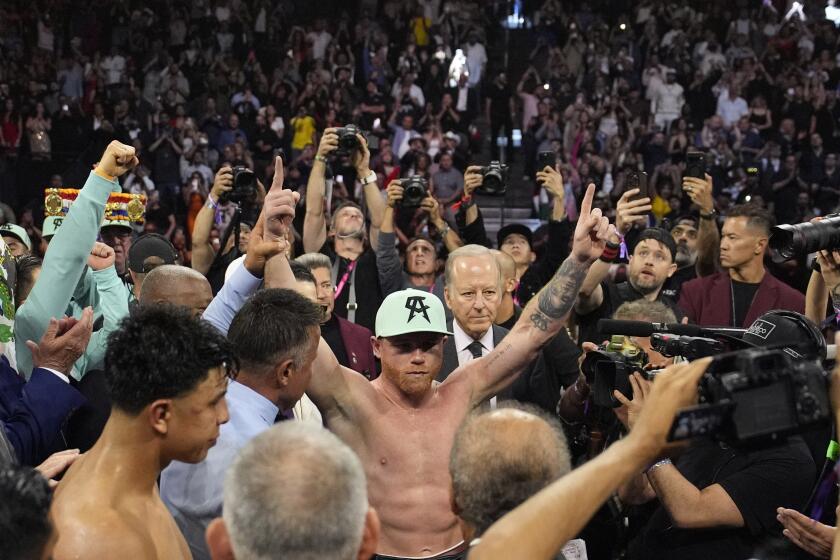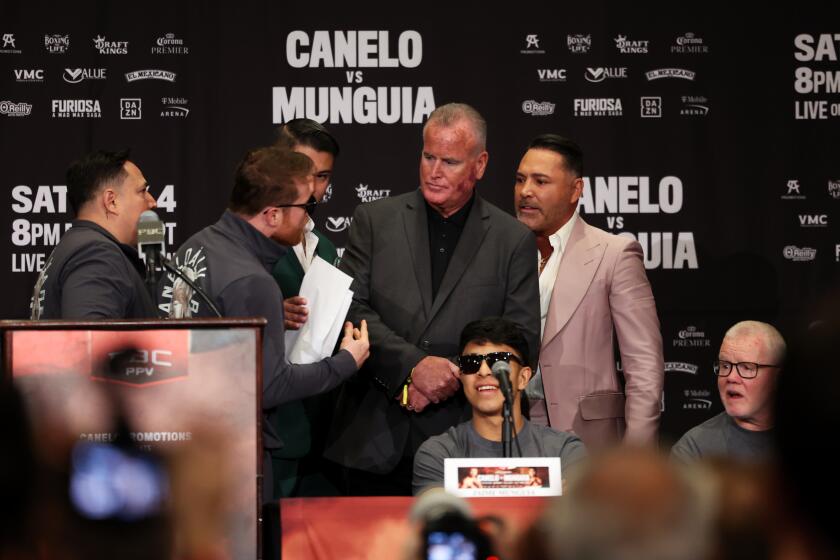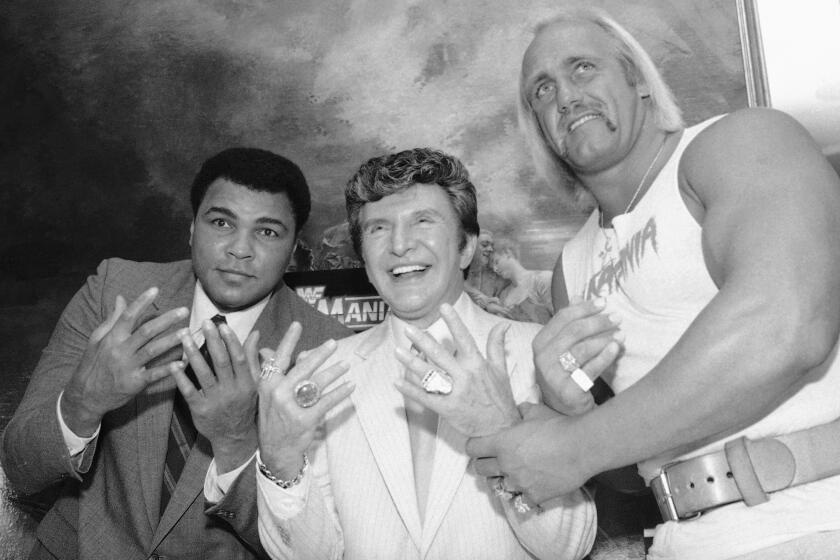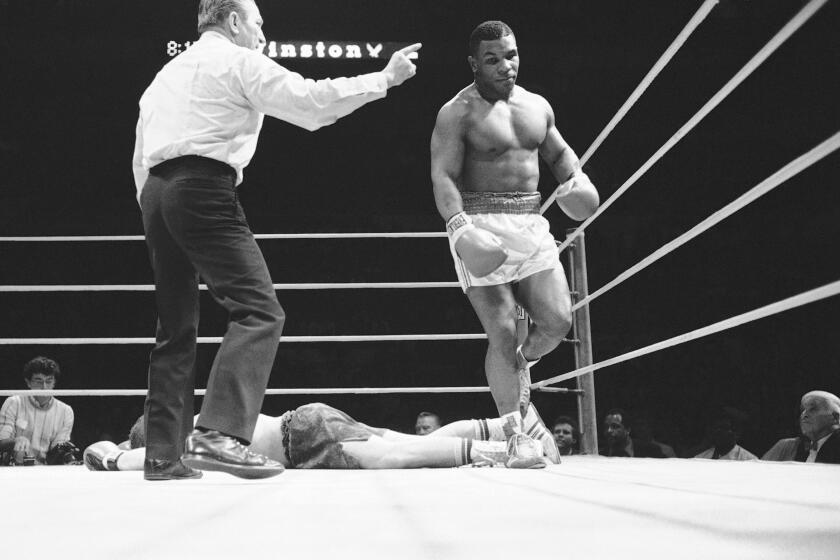BACK FROM THE BRINK
What had always been his comfort zone was suddenly a twilight zone.
Brian Viloria had known only happiness and accomplishment in the ring. He wasn’t ready for the unexpected and horrifying to occur without warning.
Throwing punches had long been exhilarating for Viloria, starting at the age of 6 when the targets were banana trees in his native Hawaii, which he pounded to strengthen his hands.
He used those punches to slug his way through the amateur ranks to the Olympics, on to the pros and, finally, to the cusp of a world title.
Until a tragedy made him dread what his fists could do.
In a bout in May at Staples Center, Viloria won in a sixth-round TKO over Ruben Contreras to improve to 17-0 with 11 knockouts. That earned a title shot against World Boxing Council light-flyweight champion Eric Ortiz on Saturday at Staples Center.
But, with a championship belt within his grasp, Viloria spent the days after that May fight questioning whether he wanted to stay in boxing in order to continue a family dream of championship glory begun by his grandfather and continued by his father.
Viloria’s focus was on Contreras, who lay at California Hospital Medical Center in a medically induced coma, briefly hovering near death because of a blood clot that had formed around his brain.
Contreras, who survived his injuries and is out of the hospital, had stopped the bout in the sixth round by turning his back on Viloria to indicate that he was quitting. But as he left the ring, Contreras collapsed, suffering a seizure.
“I questioned being in the sport,” Viloria said. “I had to tell myself that things like this do happen, that it was out of my hands.”
Officials who pored over video of the fight found it difficult to determine which punches might have caused the damage to Contreras. If anything, Viloria could have been criticized for failing to be aggressive enough against Contreras, observers said. The only powerful blows Viloria landed were several uppercuts in the round before the match was stopped.
“I’ve seen more brutal fighting in sparring sessions,” said Gary Gittelsohn, Viloria’s manager.
So, in the days after the fight, the question became: Why hadn’t a red flag gone up before the match was even made? What was a 32-year-old journeyman such as Contreras, who took a 9-16-3 record into the fight, doing in the ring against an undefeated opponent eight years his junior? Contreras had been knocked out eight times previously, four in the first round.
Dean Lohuis of the California State Athletic Commission defended the matchup, pointing out that Contreras had enjoyed a recent resurgence in his career by fighting competitively against quality opponents.
“Who knows what injuries Ruben Contreras brought into the ring with him?” Gittelsohn said. “He had been in some wars.”
All Viloria knew, however, was that a night of ecstasy had unexpectedly turned into agony. In the euphoria after his victory, Viloria, still in the ring, wasn’t even aware that Contreras had collapsed.
“I was wondering what had happened to stop the fight,” Viloria said. “I didn’t know what had caused Ruben to turn his back on me. It was only after I came out of the shower that I learned he had been taken by ambulance to the hospital.”
It wasn’t until later that night that the seriousness of Contreras’ condition sunk in to the Viloria camp.
“I am not in this sport to put anybody through that type of misery,” Viloria said. “It really shook me up.”
The day after the fight, Viloria wanted to visit his opponent in the hospital but was told he couldn’t because Contreras was in intensive care after 2 1/2 hours of brain surgery. Instead, Viloria and his father, Ben, went to church.
“I put Ruben in my prayers. I teared up. It was a tough time,” Viloria said. “I talked a lot to my family and friends, and they kept telling me that I had been in there to do a job. They supported me and kept my head on straight. Without them, I do not know how I would have been able to handle it.”
Said Gittelsohn: “The family put a wall around Brian to protect him, and encouraged him to stay in the gym.”
So, less than 48 hours after the fight, Viloria stepped into the ring at Wild Card Gym in Hollywood, where he works under trainer Freddie Roach.
“We felt it was critical to get him back on the horse as quickly as possible,” Gittelsohn said.
He got no argument from Viloria.
“I wanted to know where my head was at,” the fighter said. “I wanted to see if I was mentally capable of continuing to fight. It turned out that coming back to the gym made me feel alive again.”
It helped that the medical bulletins on Contreras were increasingly brighter. He was out of his coma. After five weeks, he was out of the hospital. And after five more weeks, he was out of the rehabilitation center where he had regained much of his awareness and muscle control.
“That took a great weight off my shoulders,” Viloria said, “knowing that he was getting better every day.”
Contrast that to Gabriel Ruelas, whose opponent in a 1995 fight, Jimmy Garcia, died after their match. In Ruelas’ next fight, he imagined he saw Garcia’s head on his opponent’s shoulders. Ruelas was never the same in the ring.
“Whatever happened before is behind me now,” Viloria said. “Ruben Contreras is OK, so there is nothing to worry about.”
Nothing except Ortiz, whom Viloria will face Saturday for the WBC title in the same Staples Center ring where the traumatic fight occurred in May.
And expected to be sitting ringside will be a special guest: Ruben Contreras.
“It means a lot to me,” Viloria said, “for him to be there.”
More to Read
Get our high school sports newsletter
Prep Rally is devoted to the SoCal high school sports experience, bringing you scores, stories and a behind-the-scenes look at what makes prep sports so popular.
You may occasionally receive promotional content from the Los Angeles Times.
